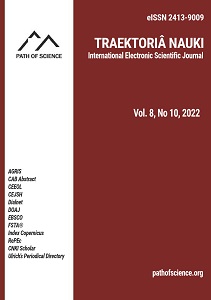Специфіка відображення граматичної інформації у «Словнику мови усної народної словесності»
The Specificity of the Display of Grammatical Information in the “Dictionary of the Language of Oral Folk Literature”
Author(s): Ruslan SerdehaSubject(s): Customs / Folklore, Lexis, Eastern Slavic Languages, Philology
Published by: Altezoro, s. r. o. & Dialog
Keywords: grammatical information; Dictionary of oral folklore language; folklore language; folklore;
Summary/Abstract: The language of folklore is peculiar. It has distinctive features at each linguistic and structural level. The grammar of works of oral folklore also has its specifics. The vocabulary of the folklore language should have an expressive linguistic direction. The vocabulary, or the register part of the linguistic dictionary, must contain grammatical information about the word. It is almost impossible to provide all the grammatical information about a lexeme entered into the dictionary register. Compilers of lexicographical works always have to limit themselves to a certain minimum necessary and sufficient to fulfill their purpose. In this paper, we will offer such a grammatical minimum, which, in our opinion, will be adequate for a qualified lexicographical description of the grammar of those verbal facts that are available in the language of folklore. The language of folklore is primarily oral speech, characterized by variability, not only at the level of texts but also at the grammar level. Traditionally, nouns are inflected with the genitive case. In this case, the main variants of inflexions must be reflected in the Dictionary of Oral Folklore. For head nouns, it is necessary to give a remark indicating the gender. It is also essential to record specific data on the number category to mark plural nouns. Adjectives, ordinal numerals, and adjectival pronouns are recorded in the original form (masculine singular nominative case). Unstressed and short forms are pretty typical for folklore texts. This expressive grammatical feature of the parts mentioned above of speech also needs, in our opinion, to be reflected in the dictionary entry. Traditionally, in Ukrainian lexicographical works, pronouns, adverbs, interjections, and service parts of speech are indicated. Dictionary entries, which include verbs, usually given in the infinitive, will traditionally be accompanied by personal forms (first and second-person singular or other endings if necessary). Be sure to indicate the type of verbs, the category of transitivity and, if necessary, intransitivity, especially in cases where the verb can appear in folklore texts in both grammatical forms. We believe indefinite forms in -ти and - ть should be given in one dictionary entry. Verb variants with the suffixes -ова and -ува should also be given in the same entry, but the form in -ова should be given separately without interpretation and cross-referenced to the main form with the suffix -ува. Grammatical information may also include those parameters that appear irregularly and are, therefore, unpredictable in a certain general model of lexicographic description.
Journal: Traektoriâ Nauki
- Issue Year: 8/2022
- Issue No: 10
- Page Range: 2008-2018
- Page Count: 11
- Language: Ukrainian

